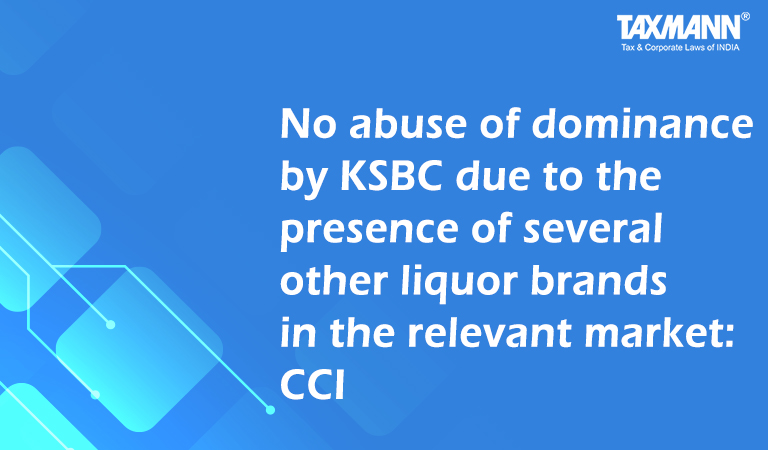No abuse of dominance by KSBC due to the presence of several other liquor brands in the relevant market: CCI
- Blog|News|Competition Law|
- 3 Min Read
- By Taxmann
- |
- Last Updated on 22 January, 2022

Case Details: Confederation of Indian Alcoholic Beverage Companies v. Kerala State Beverages (Manufacturing and Marketing) Corporation Ltd. (KSBC) - [2022] 134 taxmann.com 81 (CCI)
Judiciary and Counsel Details
-
- Ashok Kumar Gupta, Chairperson
- Ms. Sangeeta Verma and Bhagwant Singh Bishnoi, Member
Facts of the Case
In the instant case, information was filed by the Confederation of Indian Alcoholic Beverage Companies (CIABC) and Association of Distillers, Brewers and Vintners of India (collectively referred to as ‘Informants’) under section 19(1)(a) of the Competition Act, 2002 alleging contravention of the provisions of section 4 of the Act by Kerala State Beverages Corporation Ltd (‘OP1’/’KSBC’) and Travancore Sugar & Chemicals Ltd. (‘OP-2’/’TSCL’) (collectively referred to as ‘OPs’)
CIABC is an industry association representing alcohol beverages companies in India or companies closely associated with the Indian alcohol beverage industry.
The informant had alleged that OP-1 had abused its dominant position by imposing unfair and discriminatory prices and terms on private alcoholic beverages manufacturers as against Government-owned and controlled distillery and leveraged its monopoly position by providing favorable prices as well as terms and conditions on the purchase of the product of OP-1.
It was also alleged that OP-1 grants preferential treatment and considerations to the OP-2 in terms of lower wholesale margin, lower cash discount, and priority in unloading at depots, thereby placing private brands at a competitive disadvantage.
In response to the above submission, the OPs submitted that OP-1’s exclusive right is only concerning the wholesale purchase of liquor in the State of Kerala from manufacturers, and retail sale is conducted by more than 1300 vendors across the State under various categories of licenses. Thus, a monopoly in the retail sale as alleged by the IPs does not exist.
Additionally, it was stated that OP-1 has exclusive right to procure liquor in the State of Kerala is a statutory right and not a situation resulting from marketing operations. If there was no reservation in the statute providing wholesale purchase solely by OP-2, there would not have arisen a situation of an exclusive right.
Informants countered the submission of OP by stating that it not only enjoys dominance in the relevant market but also controls the retail sale of branded alcoholic beverages in the relevant geographic market. This is because of the architecture of the governing laws, which provide that manufacturers have to sell their alcoholic beverages exclusively through OP-1. As a result, the suppliers are not at liberty to make direct sales to vendors at the retail level.
CCI Held
The Commission considered the information and submission of the parties and noted that Informants have made an allegation of abuse of dominant position by OPs in respect of procurement and distribution of branded alcoholic beverages in the State of Kerala. It was noted that several manufacturers were supplying multiple liquor brands to OP-1, whereas OP-2 is supplying only one brand of rum i.e., Jawan Rum of 1000 ml, and the informant had not been able to demonstrate as to how competition, in general, with the existence of so many brands in the market, was adversely affected by granting such preference to OP 2.
The CCI further noted that the informant had not been able to demonstrate that any favor accruing to one product had resulted in the distortion of demand/consumer preference or that choice of the consumer was being impaired in any manner. Thus, no case of contravention of provisions section 4 was made out against OPs, warranting investigation.
List of Cases Referred to
-
- Xavier Residency v. State of Kerala [WP (C) No. 22195 of 2014] (para 10)
- State of Madhya Pradesh v. Nandlal Jaiswal AIR 1987 SC 251 (para 41).
Disclaimer: The content/information published on the website is only for general information of the user and shall not be construed as legal advice. While the Taxmann has exercised reasonable efforts to ensure the veracity of information/content published, Taxmann shall be under no liability in any manner whatsoever for incorrect information, if any.

Taxmann Publications has a dedicated in-house Research & Editorial Team. This team consists of a team of Chartered Accountants, Company Secretaries, and Lawyers. This team works under the guidance and supervision of editor-in-chief Mr Rakesh Bhargava.
The Research and Editorial Team is responsible for developing reliable and accurate content for the readers. The team follows the six-sigma approach to achieve the benchmark of zero error in its publications and research platforms. The team ensures that the following publication guidelines are thoroughly followed while developing the content:
- The statutory material is obtained only from the authorized and reliable sources
- All the latest developments in the judicial and legislative fields are covered
- Prepare the analytical write-ups on current, controversial, and important issues to help the readers to understand the concept and its implications
- Every content published by Taxmann is complete, accurate and lucid
- All evidence-based statements are supported with proper reference to Section, Circular No., Notification No. or citations
- The golden rules of grammar, style and consistency are thoroughly followed
- Font and size that’s easy to read and remain consistent across all imprint and digital publications are applied



 CA | CS | CMA
CA | CS | CMA
